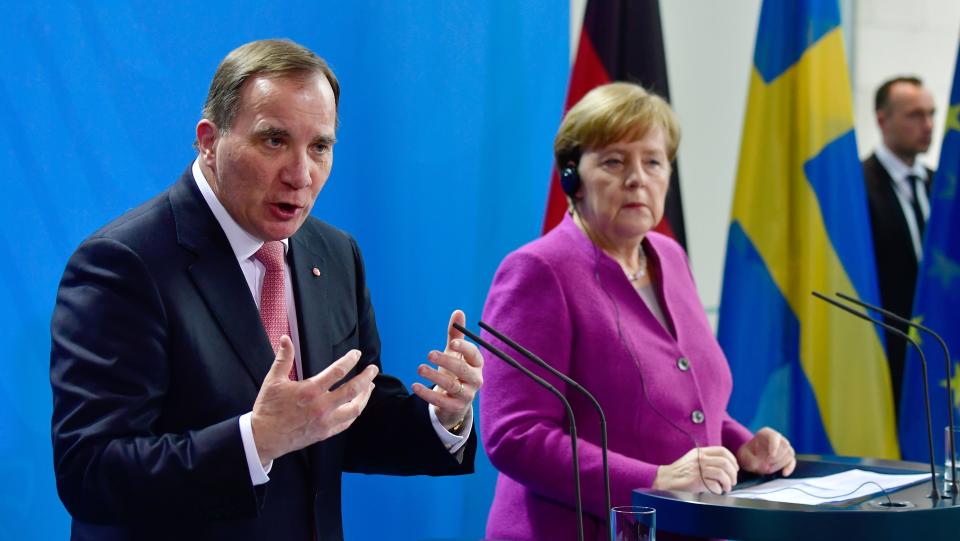Opinion: Sweden Shows No Country Is Immune To Far-Right, Anti-Immigrant Backlash

Sweden has long been one of the world’s most generous and tolerant countries. Its outlays on foreign aid and relief efforts are among the world’s highest, and with just 9.9 million inhabitants, Sweden has taken in far more than its share of migrants and refugees. Sweden has also had one of the world’s most inclusive social contracts, allowing prosperity to be broadly shared. The Swedes have long had a secret sauce of dynamic entrepreneurship, strong labor unions, and a comprehensive welfare state.
But in Sunday’s election, Sweden demonstrated that no country is immune from the anti-immigrant, far-right backlash. The neo-fascist Sweden Democrats gained 17.6 percent of the vote, upending the country’s traditional party system, and leaving both the existing center-left and center-right coalitions short of a majority.
For 80 of the past 101 years, the Social Democratic Party has formed the government in Sweden. In recent years, as minor parties have encroached on the Social Democrats’ dominance, the government has often been a coalition, complicating the ability to have a coherent program and address problems.
The outgoing government is a three-party affair of the Social Democrats, a further-left party, and a centrist one. That has given the centrists an effective veto over government policy.
Meanwhile, the current prime minister, an idealistic progressive named Stefan Löfven, has been a champion of immigrants’ rights. On my last visit to Sweden, I attended a pro-immigrant rally, and the speaker was none other than the prime minister, where he strongly defended Sweden’s openness to refugees. Löfven’s policy is admirable, but it comes with huge political risks.
Sweden’s foreign-born population is now among the world’s highest, as is Sweden’s ratio of refugee admissions to population. Today, one person in four residing in Sweden is either foreign-born or the child of two foreign-born parents.
At some point, even a tolerant nation rebels, especially when the economic security of the locals is also unraveling due to other pressures of globalization. Sitting in a café in Stockholm’s Old Town, a former member of the Social Democratic cabinet pointed to the Roma beggars going from table to table, a recent trend courtesy of the open internal borders of the European Union.
“This can’t work,” he told me sadly. “We have a social bargain where we work hard, pay high taxes, and we get a lot back. There is no room for beggars.” People begging in the streets are an affront to what it means to be Swedish.

The welfare state commanded a modest majority of popular support back when it was exclusively for Swedes. The ordinary right-wing parties have worn away at that support by trying to drive a wedge between “makers” and “takers.” But when immigrants are taking an increasing share of public services and some are visibly not working, even tolerant Swedes rebel.
The Social Democrats became Sweden’s normal majority party back in the 1930s by taking the issue of nationalism away from the far right. They came up with the concept of a “people’s homeland” – a secure and equitable social democratic society that the Swedish citizenry deserved, as Swedes.
But what happens when that close-knit homeland fills up with Iraqis, Somalis and Roma? Recent history suggests that it works fine when the numbers are relatively modest and Swedes can compliment themselves on their open-heartedness. But at some level of migration, there is a tipping point.
It’s no use to denounce Swedish voters as racist, though some surely are. Most of the people who voted for the Sweden Democrats voted for the mainstream parties back when migration levels were lower and local economic life was more secure.
If we are to defend the aspirations and rights of migrants, we also need to be mindful of realistic absorption rates and the risk of a tipping point drastically transforming public opinion in once-liberal countries. Otherwise, we defeat our own purpose.
German Chancellor Angela Merkel thought she had solved the problem by insisting that each EU member country take a fair share of refugees relative to population. The result was voter backlash and increased support for neo-fascist parties, including in her own country.
There is no easy formula, because refugee flows ― which will only worsen with global climate change ― already exceed what citizens are willing to accept.
There are also differences and similarities between the dynamics and social meanings of race and migration in Sweden and the U.S. In America, Africans were kidnapped and brought here against their will to be slaves. America has always been a nation of settlers, and the nature of “American stock” has continuously changed. It is far harder to contend in the U.S. that American-ness has a legitimate racial or ethnic definition.
Sweden, by contrast, has long been inhabited by culturally homogeneous locals. It has admitted non-Swedes mainly as acts of generosity, not enslavement. And yet, by very different routes, our two nations have come to something of the same political cauldron.
The eminent Swedish social scientist and Nobel laureate, Gunnar Myrdal, back when most white Americans were averting their eyes from the brutal realities of Jim Crow, wrote the definitive book on structural American racism. Myrdal’s great book, An American Dilemma, was published in 1944.
Now, the dilemma is also Swedish.
Robert Kuttner is co-editor of The American Prospect and a professor at Brandeis University’s Heller School. His new book is Can Democracy Survive Global Capitalism? Follow him on Twitter at @rkuttnerwrites.
ALSO ON HUFFPOST OPINION
I Refuse To Give My Black Son 'The Talk'
For Susan Collins, A Vote For Kavanaugh Would Be Political Suicide
I Am The Anonymous Iranian The NYT Published In 2009. The Trump Op-Ed Writer Is No Hero.
Love HuffPost? Become a founding member of HuffPost Plus today.
This article originally appeared on HuffPost.

